Grad On-Ground Programs Are Dead
It’s Time to Accept the Future of Graduate Education is Online
Two years ago, Kanahoma was approached by a well-regarded regional public institution to discuss a potential marketing partnership. A key component of the request was to help reverse declining enrollment in their on-ground executive MBA program. After conducting an initial analysis, we declined the partnership.
Why?
Because we believed it wasn’t a winnable game.
Rather than focusing on shifting their graduate offerings online to meet the needs of a larger, more convenience-driven market, the institution was doubling down on a model that we felt confident was in permanent decline.
What we uncovered during our analysis echoed what we’ve seen across countless other institutions since: Graduate on-ground programs, by-and-large, are in freefall.
The Data Speaks
While there are exceptions to this trend, as we’ll discuss below, the broader reality is clear: The majority of programs without a regulatory-driven, mandatory in-person component are rapidly shifting online.
To quantify this shift, we recently analyzed 10 of the most popular graduate program areas and examined completion trends across on-ground and online modalities from 2012 to 2022.
Here’s what the data revealed:
7 of the 9 programs are experiencing growth in total completions over the past 10 years, with MBA, Education, and Accounting all declining more than 10%
7 of the 9 programs are experiencing declines in on-ground completions, with Computer Science and Engineering as outlier examples of continued growth opportunities on-ground
Across all programs, online completion growth rates are outpacing on-ground
As highlighted in the below charts, all but 3 programs show that online offerings are now the largest producer of completions. Engineering and Computer Science again serve as strong outliers here, while Accounting appears to be following a similar trend as most programs, but just delayed.
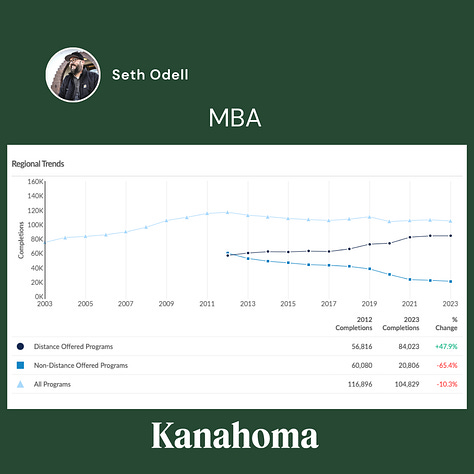
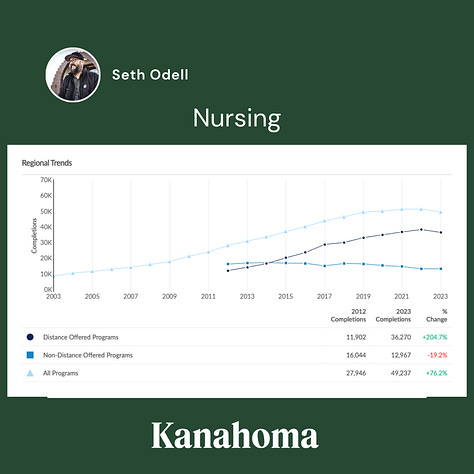
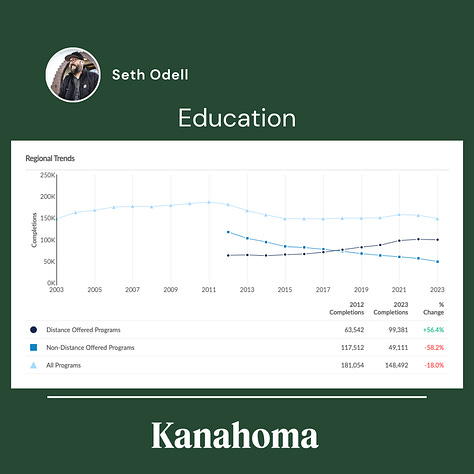
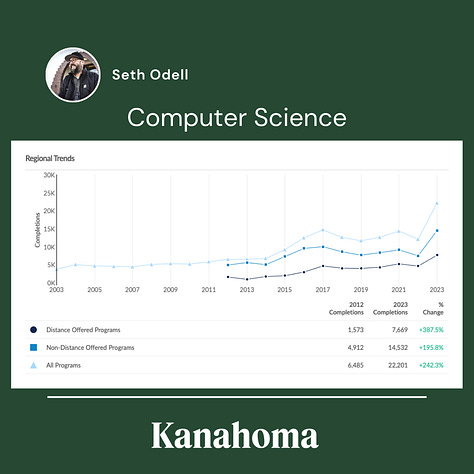
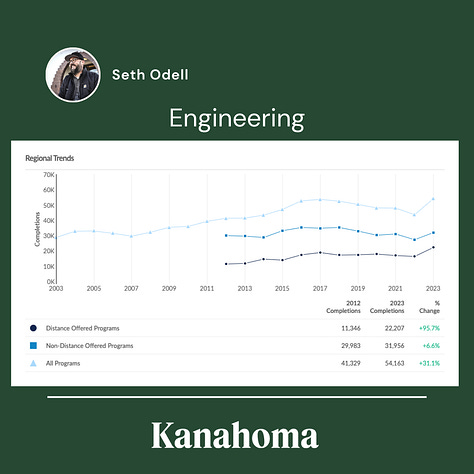
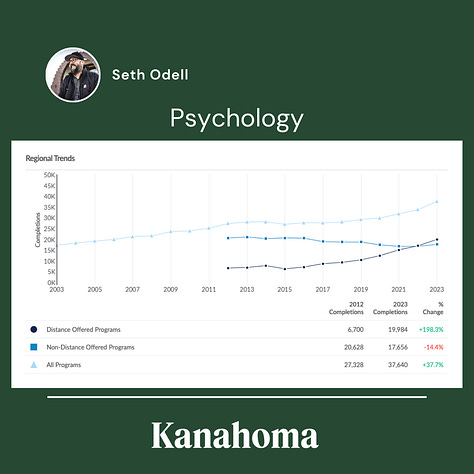
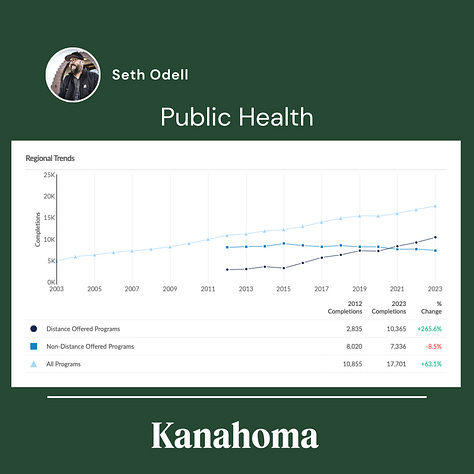
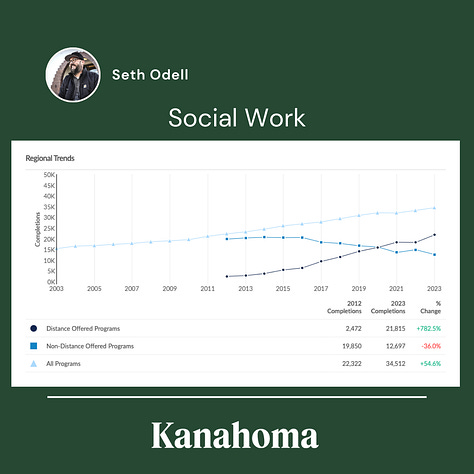
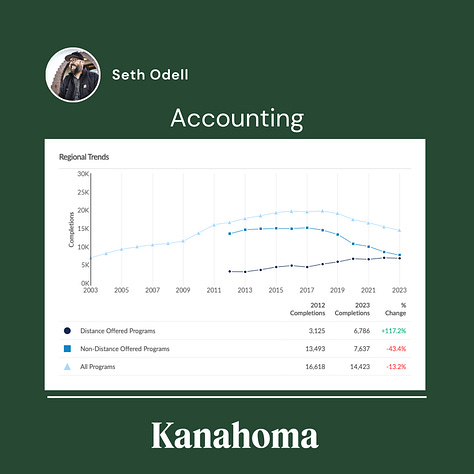
So Is On-Ground Graduate Education Really Dead?
Obviously not entirely. There are certainly examples and exceptions where on-ground graduate programs make sense. Either for specific institutions with specific offerings, or in the case of Engineering and Computer Science, which appear to be strong standouts against the broader trends.
But outside of those outliers, the trend is clear: Graduate education has moved online.
And this is a takeaway that is obvious to many of us, but is worth restating.
Because if you’re at an institution that is working to double down on recruitment in an effort to turn around declining on-ground graduate enrollment, it may just be time to acknowledge that by-and-large graduate on-ground education is a declining segment that is largely being left behind.
So if you want to grow graduate enrollment, in the majority of situations and cases, that growth will come through distance education, because the data is clear that while graduate on-ground education isn’t exactly dead, it certainly appears to be dying.
About The Author
Seth is the founder and CEO of Kanahoma, a San Diego-based performance marketing agency on a mission to build a better agency for organizations building a better world.
You can learn more about who we are and what we do at www.Kanahoma.com.





This article and the data are a wonderful example of aggregation bias. When totals are looked at, it does appear that traditional residential programs are dying and quickly. In my almost 30 years experience in higher education, there has been a steady trend of working adult students moving from campus to online programs. I have seen this in multiple institutions where I worked, but University of Phoenix is the poster child for this trend. Once they had at least 500 campuses. Today I think they have even closed the last campus in Phoenix.
The target population for grad students are usually working adults. Online options fit better than attending class in person, so no surprise to see the same trend.
However, the data reflect only certain subjects. Even then, I would wager that the data are biased. For example, in engineering, if you take out computer science and IT, I bet the pattern changes. ABET does not approve many programs even in computer science, and the lab facilities required for most fields require residential programs. The same is true for clinical health programs. While there are many online MSN programs, these tend to not be clinical. The ABA does not approve online law programs.
At one point in my career, I led an online doctoral program. While I think we did a good job, I still only recommend an online doctoral program to people who cannot do a traditional program. Traditional doctoral programs are based on a labor market of graduation assistants that learn in a master/apprentice model. I have not seen anyone do that online.
Also missing from this analysis is the MBA example specifically. The mainline universities moved low residency, executive education programs online first. Then many moved their traditional MBA programs online, but many still exist to serve students who want that traditional experience.
I think the best analogy would be bookstores. While traditional bookstores are no longer as common as they once were, they still exist and serve a need. Residential graduate programs also continue. To quote Monty Python, "I am not dead yet."